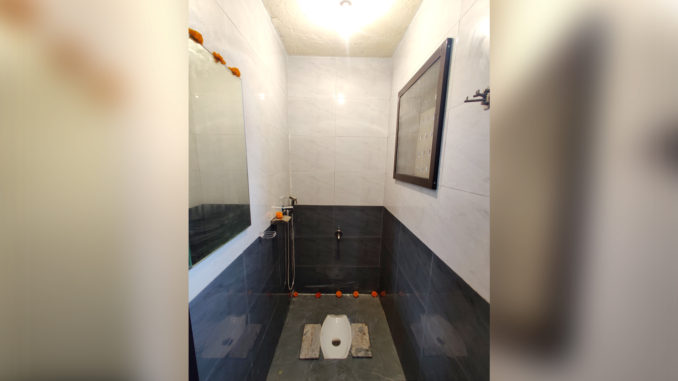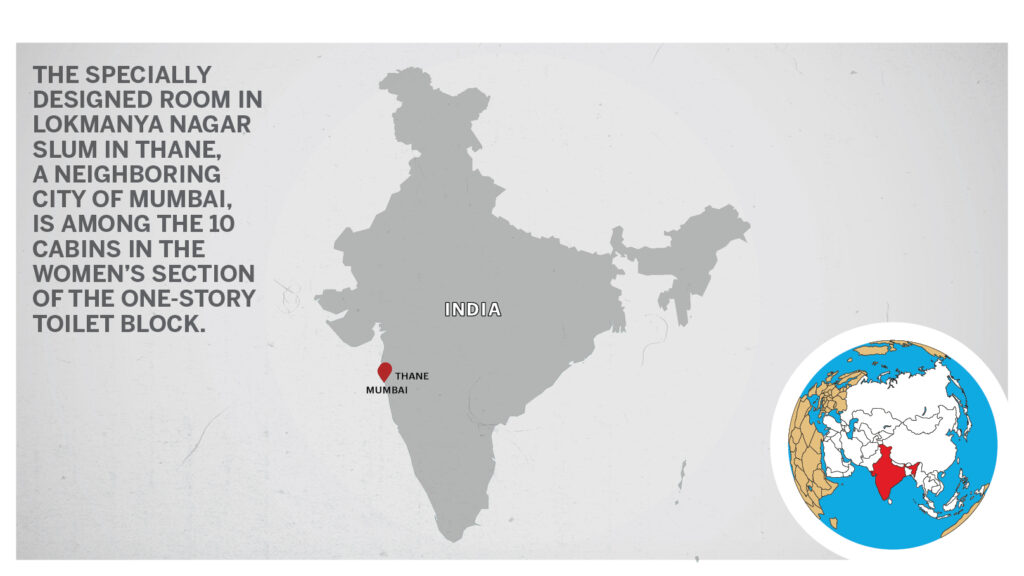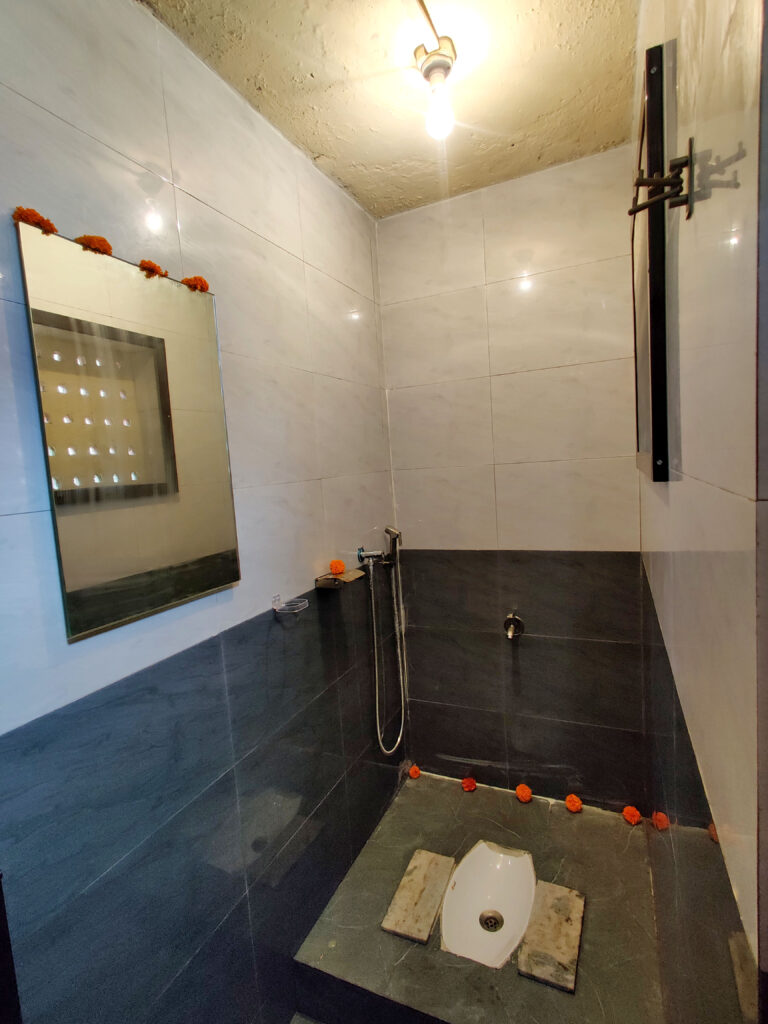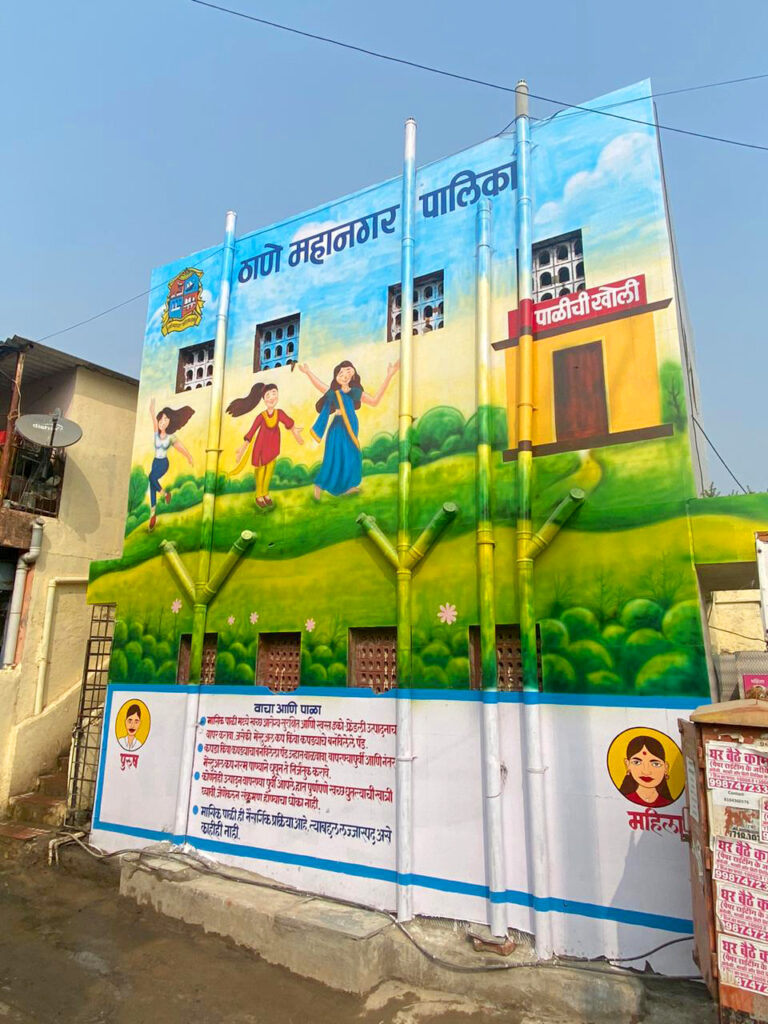
MUMBAI, India — In the 10 years that Jyoti Shinde has spent as a caretaker of a community toilet in a slum near Mumbai, this was the first time she found feminine hygiene products carefully disposed of in a bin. Commonly, soiled sanitary products are disposed of in the corners or at the back of the toilet through the window openings.
Now, a new room inside this community toilet is dedicated to providing a safe space for menstruating women and girls in the slum and for proper disposal of sanitary waste.
The specially designed room in Lokmanya Nagar slum in Thane, a neighboring city of Mumbai, is among the 10 cabins in the women’s section of the one-story toilet block. It has a wash basin styled into a urinal, a water tap, a jet spray, a mirror, a soap dispenser, a toilet roll holder, and most importantly a waste bin. A lid at the bottom of the waste bin allows for the waste to be emptied without direct contact.
Most community toilets in Indian slums do not have waste bins. 
“Women and girls are used to dumping the soiled sanitary products in the windows or at the back of the toilet,” said Shinde. “Sometimes, even when dustbins are placed in the toilet cabins, they don’t use them. Cleaning the sanitary waste is, therefore, a very big problem. Hopefully, the ‘period room’ will change things.”
The room is the concept of the nonprofit youth organization Muse Foundation. The idea emerged from the findings of a 2019 survey carried out by the foundation in 15 slum areas in Thane to understand the women’s menstrual hygiene practices. The survey found that nearly 82 percent of the 1,004 women interviewed had access to a washing area inside their homes that was used for bathing, doing the dishes, and as a urinal. Many women used the same space to change their sanitary pads. Nearly 66 percent of women did not have toilets inside their house, the survey found.
“We found that women and young girls in the slums were highly dependent on the community toilets, but unfortunately none of these toilets offered spaces to cater to them during menstruation,” said the organization’s founder, Nishant Bangera.

“The very basic requirements like running water and dustbins were absent in the community toilets. While at home, most of these women would wait to change the sanitary product till family members left the house and thus ended up using the product for long hours, which is an unhealthy practice. All these aspects drove the thought of designing a period room within the community toilets.”
For 24-year-old Sonam Kharat, the period room offers a respite.
“The room is spacious, clean and there is a dustbin, which is great,” said Kharat, who has used the room over the last few days. “It’s hard to explain the difficulties in managing periods when one has to depend on community toilets. Lack of cleanliness is a big problem.”
Kharat was born and brought up in Lokmanya Nagar. She shares her small one-room house with her parents and younger brother.
“Fortunately, the washing area in my house has a door, so there is some privacy. But many households have an open washing area and it becomes a problem for the women in the family,” said Kharat. She believes that each toilet cabin should be designed in a way so that women can manage their menstrual periods conveniently.
Another resident of the area, Swati Panchal, 47, said that the municipality should also ensure continuous water supply to the community toilets. “Water supply is still erratic,” she said.
The topic of menstruation continues to be surrounded by taboo in India. The government has introduced many schemes to promote menstrual health and open up discussions on the subject. Free distribution of sanitary pads in schools is available in many states, but in many cases there is still the absence of basic necessities like access to toilets, water and safe changing rooms.

“Most women are shy to discuss menstruation openly,” said Sejal Sawant, a youth representative from the Muse Foundation who has been going door to door, letting women know about the period room, the need for proper disposal of sanitary waste, and the importance of menstrual hygiene.
“Gradually, they do open up and share their problems. During our visits, we realized that there is a lot of willingness to use the period room because of the convenience that it offers,” Sawant said.
The period room has been developed with support from Thane Municipal Corporation, the civic body that governs the city. It now plans to have such rooms in other community toilet blocks as well.
(Edited by Uttaran Das Gupta and Judith Isacoff. Map by Urvashi Makwana.)
The post In Slum Near Mumbai, Youth Group Builds Special Room For Female Hygiene appeared first on Zenger News.
